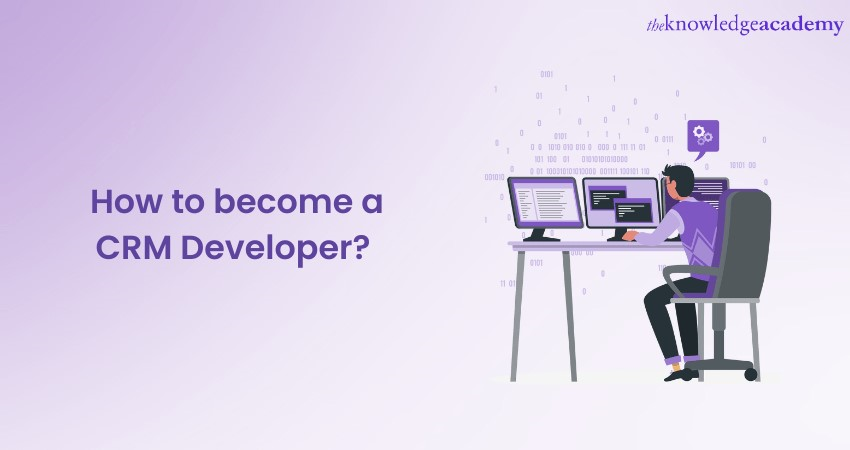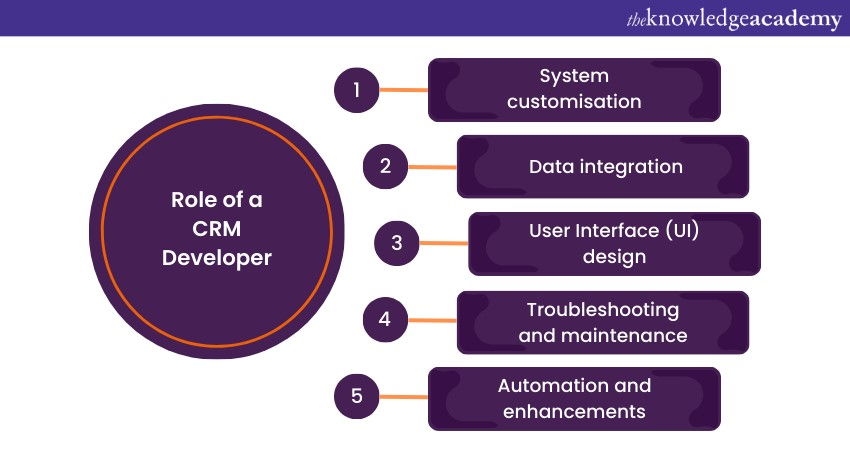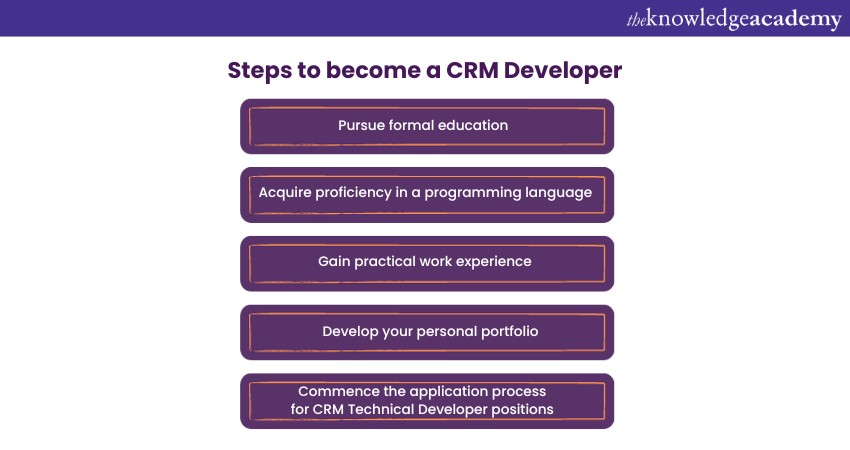We may not have the course you’re looking for. If you enquire or give us a call on 01344203999 and speak to our training experts, we may still be able to help with your training requirements.
Training Outcomes Within Your Budget!
We ensure quality, budget-alignment, and timely delivery by our expert instructors.

In today's digitally driven world, Customer Relationship Management (CRM) has become a cornerstone for businesses to manage their interactions with customers efficiently. Behind the scenes, CRM Developers play a pivotal role in designing and developing the technology that empowers businesses to nurture these relationships. If you're intrigued by the idea of becoming a CRM Developer and want to know How to Become a CRM Developer, this comprehensive blog will walk you through the entire journey.
According to Glassdoor, the average salary for a CRM Developer is £62,060 in the United Kingdom. From understanding who a CRM Developer is and what they do to the essential steps you need to take to kickstart your career as a CRM Developer, we've got it all covered. By the end, you'll have a clear roadmap on how to embark on this exciting career path, understanding How to Become a CRM Developer and make your mark in the world of Customer Relationship Management.
Table of Content
1) Who is a CRM Developer?
2) Role of a CRM Developer
3) Steps to Become a CRM Developer
a) Pursue formal education
b) Acquire proficiency in a programming language
c) Gain practical work experience
d) Develop your personal portfolio
e) Commence the application process for CRM Technical Developer positions
4) Salary of CRM Developer
5) Conclusion
Who is a CRM Developer?
A Customer Relationship Management (CRM) Developer is a skilled IT professional responsible for creating and maintaining CRM systems, which are essential tools for businesses to manage their interactions with customers. These interactions encompass everything from marketing and sales to customer service and support.
CRM Developers design, develop and customise CRM software solutions to meet the specific needs of a business. They work with various technologies and programming languages to create applications that enable companies to collect, organise, and leverage customer data effectively.

Role of a CRM Developer
CRM Developers are responsible for creating and maintaining CRM systems, which are essential for organising and utilising customer data to enhance relationships and drive business growth. Here's an in-depth look at their role:

a) System customisation: CRM Developers customise CRM software to meet the unique needs and processes of a business. They tailor the system to ensure it aligns with the company's specific requirements, enabling it to be more efficient and productive.
b) Data integration: They work on integrating CRM systems with other business applications, such as email, marketing automation, and e-commerce platforms. It ensures customer data is consistently updated, readily accessible, and utilised across various departments, providing a 360-degree view of customer interactions.
c) User Interface (UI) design: CRM Developers design user-friendly interfaces for different teams within the organisation, such as sales, marketing, and customer service. They create layouts and dashboards that enable users to navigate the CRM system with ease, making it simpler to record and retrieve information.
d) Troubleshooting and maintenance: CRM Developers are responsible for identifying and resolving any technical issues within the CRM system. They also ensure the system remains up-to-date, secure, and compliant with industry standards and regulations.
e) Automation and enhancements: They implement automation and workflow enhancements, making the CRM system more efficient. It often involves scripting and programming to create custom functions and features.
Unlock the full potential of HubSpot with our HubSpot CRM Training . Join today and transform your sales and marketing efforts!
Steps to become a CRM Developer
Becoming a CRM Developer is a promising career path in today's technology-driven business landscape. CRM Developers are the masterminds behind the software that empowers organisations to build and maintain strong customer relationships. This section of the blog explores the comprehensive journey towards becoming a proficient CRM Developer, outlining five crucial steps to set you on the right path:

1) Pursue formal education
The foundation of any successful career often begins with education. For those aspiring to become CRM Developers, this first step involves acquiring the knowledge and skills necessary to excel in this dynamic field. Here's a closer look at this initial phase:
Choosing the right degree
Selecting the right educational path is essential. While there might not be a specific degree dedicated to CRM Development, several fields can provide a solid foundation for this career. These include:
a) Computer Science: This degree offers a broad understanding of software development, programming, and database management, which are crucial skills for CRM Developers.
b) Information Technology: An IT degree equips you with the skills to manage and maintain technology systems, a valuable asset for CRM Developers.
c) Software Engineering: This program focuses on the principles of software development, including designing and building applications, which aligns with the CRM Developer role.
Online courses and certifications
In addition to formal degrees, aspiring CRM Developers should consider supplementing their education with online courses and certifications. Many platforms offer specialised courses in CRM technologies, such as Salesforce, Microsoft Dynamics, or Zoho CRM. These courses provide in-depth insights into specific CRM systems, which can be highly valuable when applying for positions with companies that use these platforms.
2) Acquire proficiency in a programming language
CRM Developers frequently use various programming languages to customise and extend CRM systems. Developing proficiency in a programming language is essential for success in this role. Here's what you need to know about this step:
Languages of choice
The choice of programming language often depends on the CRM platform you work with. For example, Salesforce primarily uses Apex and Visualforce, while Microsoft Dynamics employs languages like C# and JavaScript. It is crucial to become proficient in the languages associated with your chosen CRM system.
Online resources and courses
Countless online resources and courses are available to help you learn and master programming languages. Some websites offer comprehensive courses that cover various programming languages. These resources provide a flexible and cost-effective way to enhance your coding skills.
3) Gain practical work experience
Practical experience is invaluable when working towards a career as a CRM Developer. Internships, entry-level positions, and hands-on projects are key components of this step. Let's delve into this aspect:
Internships and entry-level positions
Look for internships or entry-level positions in organisations that use CRM systems. These roles allow you to gain firsthand experience with CRM technologies and see how they are applied in real-world business scenarios. You'll work under the guidance of experienced professionals, learning the ins and outs of CRM system customisation and development.
Building real-world projects
If opportunities for internships or entry-level positions are limited, consider taking the initiative to build your CRM-related projects. For example, you could create a basic customer database system, automate email marketing processes, or design a customer support ticketing system. These projects not only bolster your practical experience but also serve as valuable additions to your portfolio.
4) Develop your personal portfolio
A well-structured portfolio is a powerful tool for showcasing your skills and expertise as a CRM Developer. Building a compelling portfolio is the next step in your journey. Here's what you should focus on:
Showcasing your work
Your portfolio should highlight the projects you've worked on and emphasise the practical skills you've acquired. Each project should be described in detail, including the problems it solved and the CRM technologies you used.
GitHub and personal website
Consider creating a GitHub repository to store your project code. GitHub not only serves as a version control system but also showcases your coding abilities. Additionally, having a personal website where you can display your portfolio, share your experiences, and demonstrate your passion for CRM development can make a strong impression on potential employers.
5) Commence the application process for CRM Technical Developer positions
After completing the previous steps, you can apply for CRM Technical Developer positions. This final step involves crafting an impressive resume, preparing for interviews, and navigating the job search process:
Crafting an impressive resume
Tailor your resume to reflect your educational background, practical experience, and coding proficiency. Highlight your CRM-related projects, emphasising the challenges you overcame and the results you achieved. Include your portfolio link, GitHub repository, and any relevant certifications.
Navigating interviews
During interviews, be prepared to discuss your experience, projects, and how you can contribute to an organisation's CRM initiatives. Highlight your problem-solving abilities and capacity to design and customise CRM systems to meet each company's unique needs. Additionally, demonstrate your passion for CRM Development and your commitment to ongoing learning as the field continually evolves.
Unlock the full potential of Microsoft Dynamics CRM - Join our Microsoft Dynamics CRM Masterclass today and supercharge your Customer Relationship Management!
Salary of CRM Developer
The salaries of CRM Developers vary depending on the country, experience, skills, and industry. Here is a brief overview of the average annual salaries of CRM Developers in some countries:
a) USA: The average salary for a CRM Developer in the USA is $113,867, ranging from $40,000 to $168,000. The salary may depend on the CRM platform, such as Microsoft Dynamics, Salesforce, or Oracle.
b) UK: The average salary for a CRM Developer in the UK is £45,000, ranging from £25,000 to £75,000. The salary may vary depending on the location, experience, and skills.
c) Singapore: The average salary for a CRM Developer in Singapore is S$60,000, ranging from S$36,000 to S$96,000. The industry, education, and certification may influence the salary.
d) Australia: The average salary for a CRM Developer in Australia is A$90,000, ranging from A$50,000 to A$140,000. The salary may depend on the CRM system, such as Microsoft Dynamics 365, Salesforce, or Zoho.
e) Canada: The average salary for a CRM Developer in Canada is C$72,000, ranging from C$40,000 to C$120,000. The salary may vary depending on the experience level, skills, and location.
f) UAE: The average salary for a CRM Developer in UAE is AED 120,000, ranging from AED 60,000 to AED 240,000. The salary may be affected by the CRM platform, such as Microsoft Dynamics CRM, Salesforce, or SAP.
g) India: The average salary for a CRM Developer in India is ₹6.4 lakhs, ranging from ₹2.4 lakhs to ₹10 lakhs. The salary may depend on the experience level, skills, and industry.
|
Country |
Average salary |
Range |
|
USA |
$113,867 |
$40,000 - $168,000 |
|
UK |
£45,000 |
£25,000 - £75,000 |
|
Singapore |
S$60,000 |
S$36,000 - S$96,000 |
|
Australia |
A$90,000 |
A$50,000 - A$140,000 |
|
Canada |
C$72,000 |
C$40,000 - C$120,000 |
|
UAE |
AED 120,000 |
AED 60,000 - AED 240,000 |
|
India |
₹6.4 lakhs |
₹2.4 lakhs - ₹10 lakhs |
Boost your customer relationship management skills with our CRM Training. Join now for success!
Conclusion
If you want to know How to Become a CRM Developer, it's all about following a clear path. This blog has shown you the way. By pursuing relevant education, mastering programming languages, gaining hands-on experience, building an impressive portfolio, and applying for CRM Developer roles, you can embark on a rewarding journey to become a CRM Developer. Your skills will shape the future of customer relationships.
Unlock your Salesforce potential with our Salesforce CRM Masterclass – Join now and elevate your CRM skills!
Frequently Asked Questions
Upcoming Office Applications Resources Batches & Dates
Date
 HubSpot CRM Training
HubSpot CRM Training
Fri 17th Jan 2025
Fri 21st Mar 2025
Fri 16th May 2025
Fri 18th Jul 2025
Fri 19th Sep 2025
Fri 21st Nov 2025







 Top Rated Course
Top Rated Course


 If you wish to make any changes to your course, please
If you wish to make any changes to your course, please


